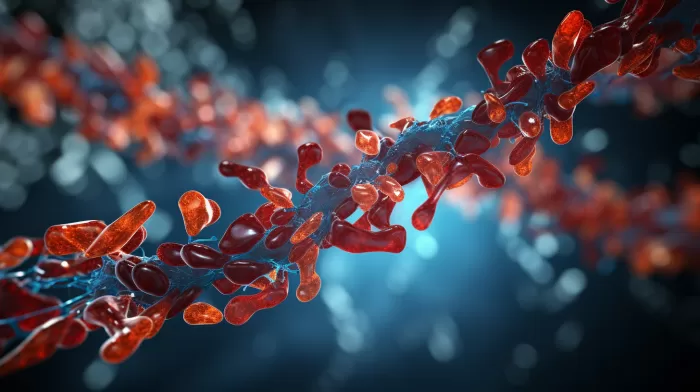Controlling your appetite is crucial for losing pounds and maintaining a healthy weight. Thanks to researchers at the Université de Lyon in France, we now have a better understanding of how one particular nutrient plays a significant role in the communication between the brain and intestines, signaling when it’s time to stop eating. That nutrient is protein.
Protein: The Appetite Regulator
When you consume foods rich in protein, enzymes break down the protein into peptides, which then block receptors along the walls of the portal vein. The portal vein is a major blood vessel that transports blood from the gut. Consequently, the peptides send messages to the brain, leading to nerve signals being sent back to the gut, instructing it to release glucose. This glucose release effectively zaps your appetite.
In the words of Dr. Gilles Mithieu, senior author of the study, “These findings explain the satiety effect of dietary protein, which is a long-known but unexplained phenomenon. They provide a novel understanding of the control of food intake and of hunger sensations, which may offer novel approaches to treat obesity in the future.”
Why Protein Satiates
To grasp why protein is more satiating than carbohydrates and fats, it’s essential to understand how our body processes each type of nutrient. According to a study published in the American Journal of Clinical Nutrition, high-protein foods slow stomach emptying, which helps you feel full for longer periods. Consequently, this can reduce your caloric intake while boosting your metabolism.
In addition, the study revealed that protein is more satiating than carbohydrates due to its thermic effect. The thermic effect of food refers to the amount of energy our body requires to process, digest, and absorb any given nutrient. Proteins have a higher thermic effect (20-35% of total calories burned) than carbohydrates (5-15%) and fats (0-3%), which means our body expends more energy to break down and utilize proteins.
As a result, the higher the thermic effect, the more satiating a nutrient may become. Therefore, consuming protein-rich foods can not only help curb your appetite but also increase your total daily energy expenditure, promoting weight loss.
Protein-Rich Foods to Add to Your Diet
To take advantage of protein’s appetite-zapping abilities, it’s crucial to incorporate protein-rich foods into your daily meals. Here are some high-protein options:
- Meat: Lean meats such as chicken, turkey, and certain cuts of beef are protein powerhouses. For example, a 3-ounce serving of skinless chicken breast packs a whopping 24 grams of protein.
-
Fish and seafood: Fish such as salmon and tuna are not only excellent sources of protein but also provide heart-healthy omega-3 fatty acids.
-
Eggs: A single large egg contains around 6 grams of protein and is also an excellent source of vitamins and minerals.
-
Legumes: Beans, lentils, and chickpeas offer a plant-based source of protein. For instance, a cup of cooked lentils provides about 18 grams of protein.
-
Dairy: Greek yogurt, cottage cheese, and low-fat cheese are rich in protein and offer a variety of nutrients.
-
Nuts and seeds: Almonds, chia seeds, and pumpkin seeds are protein-packed options that can be easily incorporated into your meals.
A Practical Approach to Protein
While consuming protein-rich foods can help suppress your appetite, it’s important to remember that moderation is essential. A well-balanced diet that includes protein, carbohydrates, and fats is necessary to maintain overall health and wellness.
The Recommended Dietary Allowance (RDA) for protein is approximately 0.8 grams of protein per kilogram of body weight. However, individual needs may vary depending on factors such as age, gender, activity level, and overall health.
Incorporate protein-rich foods throughout your meals and snacks, and aim for a diverse range of sources, including both plant-based and animal-derived options. This approach can help ensure you’re obtaining all the essential amino acids and key nutrients necessary for optimal health while reaping the appetite-curbing benefits of protein.



